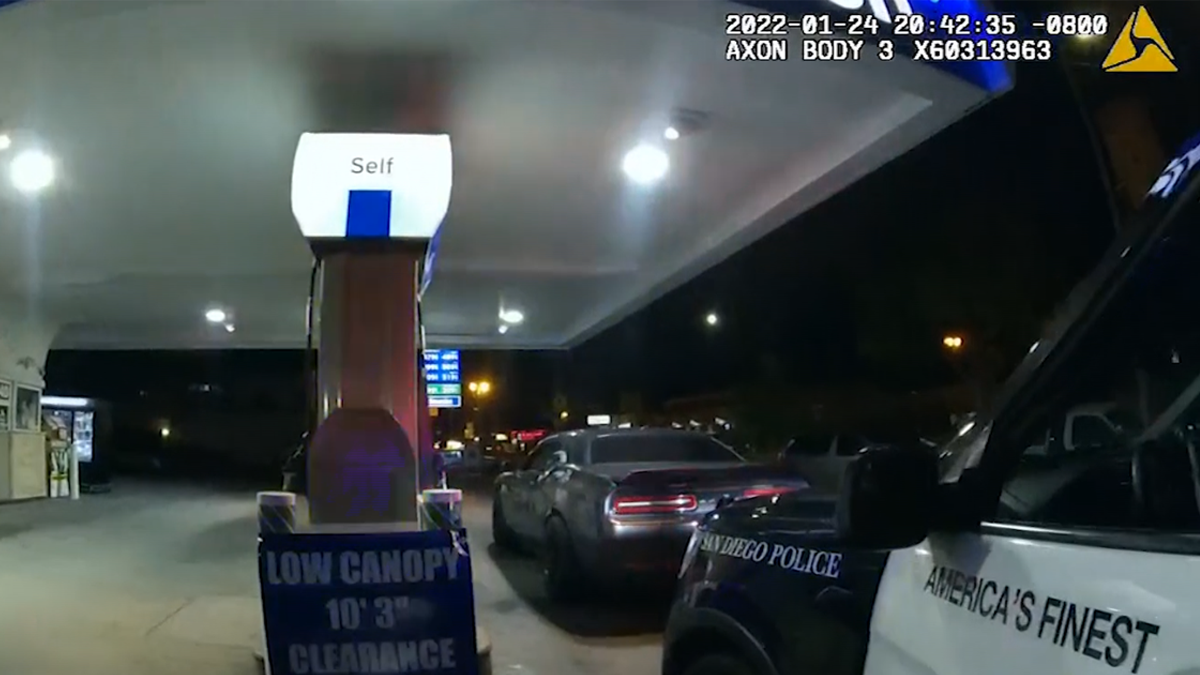A San Diego County judge ruled last week that a police officer did not exercise racial bias during a traffic stop. In both his police body-worn camera footage and testimony in court, Officer Ryan Cameron, who is White, says he pulled over a Black driver partly because he and his passenger were wearing hoodies.
“Both of their hoodies were up which prevents a side profile,” said Cameron on the witness stand when asked about why he pulled a U-turn to follow the Black driver. “So I cannot see who is inside that vehicle.”
It is not against the law to wear a hoodie while driving. The police report listed the official reason for the stop as an obscured rear license plate. Multiple witnesses for the defense pointed out the officer could not have known about that until he decided to make a U-turn to follow the vehicle.
The man behind the wheel was Tommy Bonds III, and he knew the man in uniform who stopped him. According to their conversation recorded on Cameron’s body-worn camera, Bonds had been pulled over by Cameron before. But this time, Bonds pressed Cameron on the reason behind the stop. Below is a transcript from the body-worn camera video obtained by NBC 7 Investigates.
Get top local stories in San Diego delivered to you every morning. Sign up for NBC San Diego's News Headlines newsletter.
| Officer Cameron: “How ya been?” |
| Tommy Bonds: “Good, actually. But you … you turned around 'cause you saw two ****** in a car probably.” |
| Officer Cameron: ”What’s that?” |
| Bonds: “I said we saw you turn around because you saw two guys — two Black guys — in the car obviously.” |
| Cameron: “Well, part of it. The hoodie is up and stuff, just the climate and everything that’s going on in the city these days.” |
Cameron then goes on to say he, too, gets stopped because of the way he looks: “I’m sleeved up. They stop me all the time if I’m wearing a snapback backward.”
Bonds was ultimately arrested and charged with a misdemeanor after he told Cameron his registered firearm was unloaded and inside the car. Officers then searched him and the vehicle. Police said Bonds’ gun was placed too close to ammunition, making it a concealed-carry violation.
In court, Bonds’ public defender Abe Genser questioned Cameron about what he said during the stop about also being pulled over.
“It’s a form of de-escalation that I use,” Cameron said. “I’ve never been stopped in East County. I’ve never been stopped in the county of San Diego. When someone throws the race card out, I use that, and I’ve developed it over my career as a way to de-escalate away from that situation, because race has no relevance, has no bearing on a traffic stop, and that conversation just goes in a constant loop, so I just nip it in the bud.”
“So your de-escalation technique is to lie to them that you also get racially profiled?” Genser asked.
“Sure. I made it up to put him at ease,” Cameron responded. “People like to be heard.”
In a written ruling, Judge Howard Shore said his decision came down to whether he believed Cameron committed perjury when he testified on the stand that race did not factor into his decision to stop Bonds. Shore said he believed the officer and thus found the traffic stop was not racially motivated.
The court ruling is a landmark for San Diego. It's the first time San Diego County has held a hearing under the state's new Racial Justice Act. The law allows the court to dismiss cases if any racial bias was exercised during an interaction with law enforcement, from detainment to prosecution to even sentencing.
In an interview with NBC 7 Investigates, the author of the Racial Justice Act pointed to Bonds’ case as a perfect example of the types of cases lawmakers intend to use this legal motion.
California Assemblymember Ash Kalra, who represents the 27th District in the Bay Area, stressed that had Bonds lacked evidence like body-cam video, his public defender could use statistical data that shows racial disparities.
“Well, how many people are pulled over for license-plate covers versus how many license-plate covers exist out there?” Kalra said. “And if you show that only Black men are pulled over for license-plate covers, that by itself could be a case you can make as well.”
More Coverage on the Racial Justice Act and Policing
Genser introduced three expert witnesses in policing bias and ethics, as well as San Diego police data on traffic stops showing a disparity between police stops on Black and White drivers.
However, Judge Shore made it clear at the start and end of the hearing that, while he would allow statistics such as SDPD traffic stop data in court, he would not necessarily factor them into his decision. Shore also repeatedly stated that in his experiences, statistics “cannot speak to what goes on in an individual’s mind in a specific moment.”
In an email to NBC 7 Investigates, Genser called the ruling “disheartening” and said he’s even more worried about its implications.
“Wearing a hoodie in a car isn’t illegal,” said Beth Mohr on the witness stand on behalf of Bonds’ defense. “Just wearing a hoodie isn’t a valid reason to conduct a traffic stop.”
Mohr was a San Diego police officer for eight years but retired after an on-duty injury. She is now a nationally certified POST standards and ethics instructor who regularly reviews articles on bias in policing. Mohr took issue with several elements of the stop, including part of the reason Cameron said he stopped Bonds
“That is not OK,” Mohr said. “That is precisely what is not supposed to happen in terms of equal treatment and unbiased policing.”
Had the judge ruled the other way, Bonds’ charge could have been dismissed.



